
The United States Department of Justice (DOJ), also known as the Justice Department, is a federal executive department of the United States government tasked with the enforcement of federal law and administration of justice in the United States. It is equivalent to the justice or interior ministries of other countries. The department is headed by the U.S. attorney general, who reports directly to the president of the United States and is a member of the president's Cabinet. The current attorney general is Merrick Garland, who has served since March 2021.
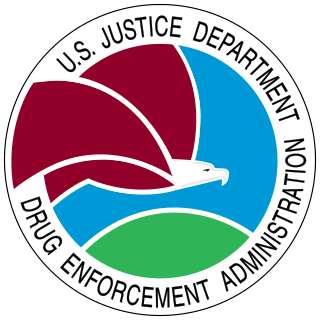
The Drug Enforcement Administration (DEA) is a United States federal law enforcement agency under the U.S. Department of Justice tasked with combating illicit drug trafficking and distribution within the U.S. It is the lead agency for domestic enforcement of the Controlled Substances Act, sharing concurrent jurisdiction with the Federal Bureau of Investigation, the U.S. Immigration and Customs Enforcement, and U.S. Customs and Border Protection. However, the DEA has sole responsibility for coordinating and pursuing U.S. drug investigations both domestically and internationally.
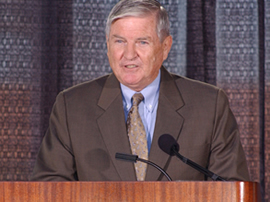
John C. "Jack" Lawn served as the 4th Administrator of the Drug Enforcement Administration (DEA) from 1985 to 1990. On 1 March 1985, Lawn, who had served as Deputy Administrator since 1982, was designated Acting Administrator following the retirement of Francis M. Mullen. On 4 April 1985, he was nominated by President Ronald Reagan to be the next Administrator of the DEA. Mr. Lawn was confirmed by the U.S. Senate on 16 July 1985, and sworn in on 26 July 1985.
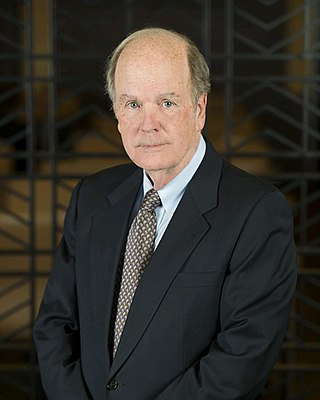
Robert Cleve Bonner is an American lawyer and arbitration neutral, a former prosecutor, former United States District Judge, former Administrator of the Drug Enforcement Administration and former Commissioner of United States Customs and Border Protection. He is a member of the Board of Trustees of the California Institute of Technology, a retired partner at the law firm Gibson, Dunn & Crutcher and former Chair of the California Commission on Judicial Performance.

The Bureau of Narcotics and Dangerous Drugs (BNDD) was a federal law enforcement agency within the United States Department of Justice with the enumerated power of investigating the consumption, trafficking, and distribution of narcotics and dangerous drugs. BNDD is the direct predecessor of the modern Drug Enforcement Administration (DEA).

The Federal Bureau of Narcotics (FBN) was an agency of the United States Department of the Treasury, with the enumerated powers of pursuing crimes related to the possession, distribution, and trafficking of listed narcotics including cannabis, opium, cocaine, and their derivatives. Headquartered in Washington, D.C., the FBN carried out operations and missions around the world. The bureau was in existence from its establishment in 1930 until its dissolution in 1968. FBN is considered a predecessor to the Drug Enforcement Administration.

The Organized Crime Drug Enforcement Task Force (OCDETF) is a federal drug enforcement program in the United States, overseen by the Attorney General and the Department of Justice. The principal mission of the OCDETF program is to identify, disrupt, and dismantle the major drug trafficking operations and tackle related crimes, such as money laundering, tax and weapon violations, and violent crime, and prosecute those primarily responsible for the nation's drug supply.

Anne Melissa Milgram is an American attorney and academic who currently serves as Administrator of the Drug Enforcement Administration (DEA) since 2021. She previously served as the 57th Attorney General of New Jersey from 2007 to 2010.

The United States Organized Crime Strike Force (Strike Forces) is a program of the United States Department of Justice Criminal Division empowering individual and coordinated units based in American cities across the country to pursue illegal racketeering by organized crime syndicates, including the Mafia, Gangs, the Irish Mob, the Russian mafia, and more. The Strike Forces have largely been eliminated since Attorney General Dick Thornburgh in 1989 merged the Strike Forces with the AUSAs, in what was called the "slow death" of the effort against organized crime. Other Strike Forces have been merged with the Strike Forces of the Organized Crime Drug Enforcement Task Force (OCDETF), losing the focus of racketeering to focus on drugs and narcotics.

Michele Marie Leonhart is an American career law enforcement officer who served as Administrator of the Drug Enforcement Administration (DEA) from 2010 to 2015, as well as in an acting capacity from 2007 to 2010. After the resignation of Administrator Karen P. Tandy in the fall of 2007, Leonhart also served as Acting Administrator of the DEA. On February 2, 2010, President Barack Obama nominated Leonhart for the position of DEA Administrator.

Vanita Gupta is an American attorney who served as United States Associate Attorney General from April 22, 2021, to February 2, 2024. From 2014 to 2017, Gupta served as Assistant Attorney General for the Civil Rights Division under President Barack Obama.
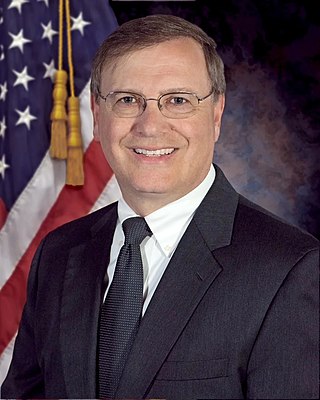
Chuck Rosenberg is an American attorney who served as Acting Administrator of the Drug Enforcement Administration from 2015 to 2017. He formerly served as the U.S. Attorney for the Eastern District of Virginia (EDVA) and for the Southern District of Texas; as a senior FBI official on the staff of two FBI Directors; as Counselor to the Attorney General; as the Chief of Staff to the Deputy Attorney General; and as an Assistant U.S. Attorney in the Eastern District of Virginia in Norfolk and Alexandria.

Uttam Anthony Singh Dhillon is an American attorney and law enforcement official who served as Acting Administrator of the Drug Enforcement Administration from July 2, 2018, to May 18, 2020. He is married to Janet Dhillon, a former commissioner of the Equal Employment Opportunity Commission.
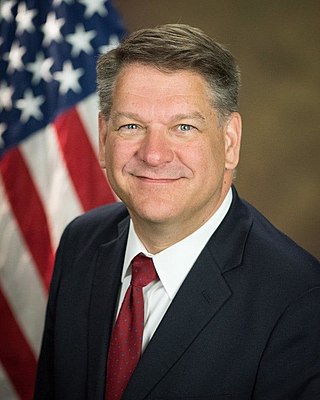
Timothy Shea is an American attorney and prosecutor who served as acting Administrator of the Drug Enforcement Administration from 2020 to 2021. Previously, he was interim United States attorney for the District of Columbia, the country's largest U.S. attorney's office; a senior counselor to U.S. Attorney General William Barr at the Department of Justice; a lobbyist; and private corporate lawyer.
Carolyn Pokorny is a career federal prosecutor, currently serving as First Assistant United States Attorney at the United States Attorney for the Eastern District of New York. Previously she served as the Inspector General for the New York City Metropolitan Transportation Authority at the Office of the MTA Inspector General. She is the first woman to hold that position.
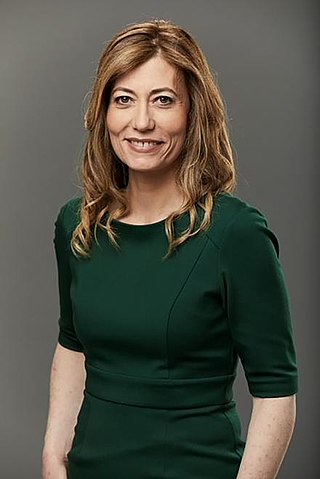
The Administrator of the Drug Enforcement Administration is the head of the Drug Enforcement Administration, a United States federal law enforcement agency under the United States Department of Justice, tasked with combating drug trafficking and distribution within the United States. The current administrator is Anne Milgram.

Johnathan (Jack) E. Ingersoll was an American police officer and federal law enforcement agent. He was the first Chief of Police in Charlotte, North Carolina to use computers on the job. Ingersoll was the only Director of the Bureau of Narcotics and Dangerous Drugs (BNDD), and resigned amid the Watergate scandal. The BNDD was merged into the Drug Enforcement Administration two days after he departed from the government.

John Haywood Finlator was an American federal administrator and narcotics law enforcement director. He was the first and only director of the Bureau of Drug Abuse Control (BDAC), and later served as deputy director of the Bureau of Narcotics and Dangerous Drugs (BNDD). He was one of the first members of the narcotics enforcement community that advocated for decriminalizing cannabis and marijuana. This advocacy often set him at odds with his coworkers at the bureau and with Congress but was praised by many medical community members.

John Ries Bartels Jr. is an American lawyer and was the first Administrator of the Drug Enforcement Administration. He was also the first Chief of the New Jersey Organized Crime Strike Force.

















